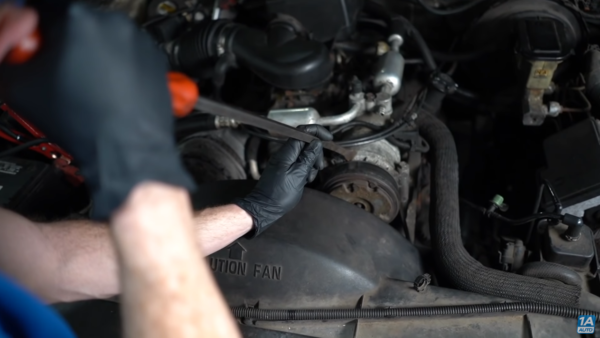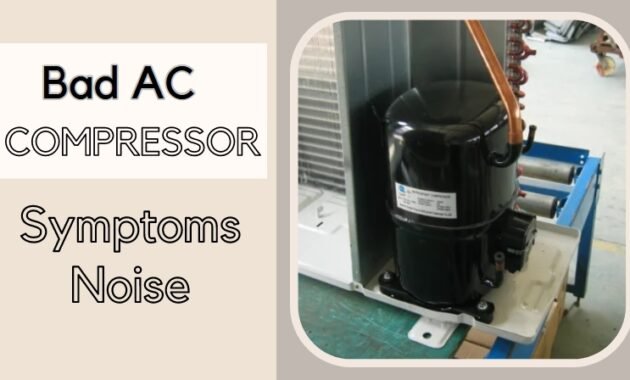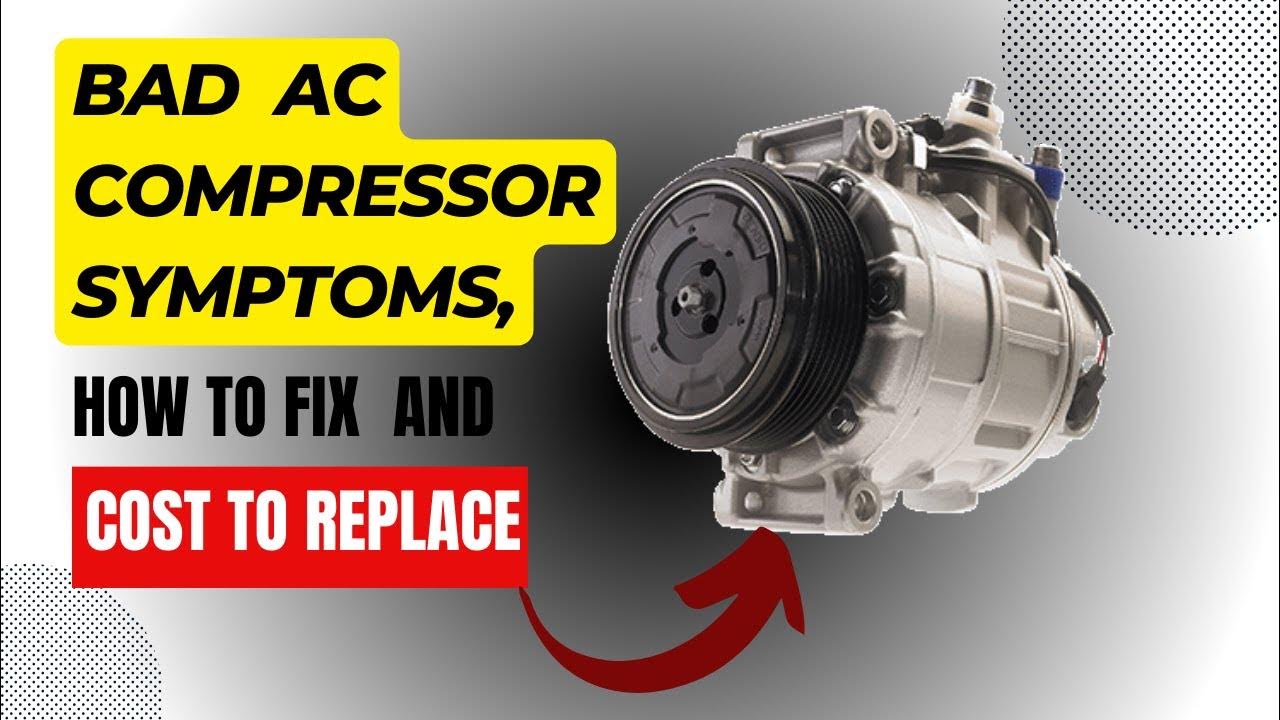What Does A Bad Ac Compressor Sound Like

Is your home feeling stuffy and uncomfortable despite your AC running? Maybe it's blowing warm air, or perhaps it cycles on and off too frequently. These are frustrating signs that your air conditioning system might be struggling. While many components can cause AC problems, one common culprit is a failing compressor.
The AC compressor is the heart of your cooling system. It's responsible for circulating refrigerant, the fluid that absorbs and releases heat, allowing your AC to cool your home. When the compressor starts to fail, it can manifest in a variety of ways, including some very distinctive noises. This article will guide you through diagnosing potential compressor issues by listening to the sounds your AC is making. We'll also cover some simple checks you can perform yourself and, importantly, when it's time to call in the professionals.
Diagnosing a Bad AC Compressor: Listen Closely
Before we dive into the specific sounds, it's important to understand where to listen. The compressor is typically located within the outdoor unit of your central air conditioning system. This unit usually sits on a concrete pad near your house. Make sure the area around the unit is clear and safe before approaching it.
Safety First! Before inspecting your AC unit, turn off the power to it at the circuit breaker. This prevents any accidental electrical shock. Locate the breaker labeled "AC," "Air Conditioner," or "Outdoor Unit" and switch it to the "off" position.
Step 1: Initial Observation (No Tools Needed)
Start with a visual inspection of the outdoor unit. Look for any obvious signs of damage, such as:
- Physical damage: Dents, cracks, or rust on the unit casing.
- Debris: Leaves, branches, or other obstructions blocking the airflow around the unit. Clear any debris away from the unit.
- Refrigerant leaks: Oily residue or a hissing sound coming from the unit can indicate a refrigerant leak. *Do not attempt to handle refrigerant yourself.*
Now, turn the power back on at the breaker. Listen carefully as the AC unit starts up. Pay attention to any unusual noises coming from the compressor.
Step 2: Identifying Specific Problem Sounds
Here are some common sounds that indicate a failing AC compressor:
- Loud Clicking or Clanging: This is often a sign of a mechanically failing compressor. Internal components may be broken or loose, causing the jarring noise. This usually indicates significant damage and the need for a replacement.
- Grinding: A grinding noise suggests internal friction and wear. The compressor's moving parts may be rubbing together due to lack of lubrication or worn bearings. This is a serious problem that will likely lead to complete compressor failure.
- Buzzing or Humming: While a slight hum is normal, a loud or persistent buzzing can indicate an electrical issue within the compressor, such as a failing capacitor or a problem with the motor windings. It could also indicate that the compressor is struggling to start.
- Screeching or Squealing: This sound often points to a worn or slipping belt if your compressor uses a belt-driven system (older models). However, it can also be related to internal components failing within the compressor itself.
- Hissing: As mentioned before, a hissing sound *may* not always come from the compressor itself; most of the time it indicates a refrigerant leak. If you suspect a refrigerant leak, turn off the unit immediately and contact a qualified HVAC technician. Refrigerant is harmful to the environment and can be dangerous to handle without proper training and equipment.
Step 3: Simple DIY Checks (Minimal Tools Needed)
Before calling a professional, there are a few simple checks you can perform. Remember to turn off the power at the breaker before performing any of these checks!
- Check the Capacitor (Requires a Non-Contact Voltage Tester): The capacitor is a cylindrical component that helps start the compressor motor. A failing capacitor is a common cause of compressor issues.
Important Safety Note: Capacitors can store a dangerous electrical charge, even after the power is turned off. *Always discharge the capacitor before handling it.* To do this safely, you can use a screwdriver with an insulated handle to short the terminals (be careful!). Alternatively, hire a professional to do it for you.
Visually inspect the capacitor. Look for signs of bulging, leaking, or corrosion. If it looks damaged, it likely needs to be replaced. Testing a capacitor requires a multimeter with capacitance testing capabilities. If you are not comfortable using a multimeter, it is best to leave this to a professional.
Using a Non-Contact Voltage Tester: Ensure the capacitor is discharged. Set your non-contact voltage tester to the appropriate voltage range (usually AC voltage). Carefully wave the tester near the capacitor terminals. If the tester detects voltage, even with the power off, it indicates that the capacitor is holding a charge and needs professional attention. A defective capacitor can cause damage to the compressor.
- Check for Obstructions: Ensure that the outdoor unit is free from obstructions. Clear away any debris, such as leaves, branches, or overgrown vegetation, that may be blocking airflow. Proper airflow is essential for the compressor to operate efficiently.
- Check the Wiring (Visual Inspection): Carefully inspect the wiring connections to the compressor. Look for any loose, corroded, or damaged wires. If you find any issues, try to carefully tighten or replace them (again, power off!). If you are unsure about working with electrical wiring, it is best to call a professional.
Step 4: When to Call a Professional
While some AC problems can be addressed with simple DIY solutions, compressor issues often require professional attention. Here are some situations where it's best to call an HVAC technician:
- Any time you are uncomfortable working with electricity or refrigerant.
- If you suspect a refrigerant leak.
- If you hear loud clicking, clanging, grinding, or other severe noises coming from the compressor. These sounds usually indicate significant internal damage.
- If the compressor is not starting at all.
- If you have already tried basic troubleshooting steps and the problem persists.
- If you are unsure about any aspect of the repair process. It's always better to be safe than sorry when dealing with complex and potentially dangerous equipment.
An HVAC technician has the knowledge, experience, and tools to accurately diagnose the problem and perform the necessary repairs or replacements. They can also ensure that your AC system is operating safely and efficiently.
Preventing Future Compressor Problems
While compressor failure can sometimes be unavoidable, there are steps you can take to help prolong its lifespan:
- Regular Maintenance: Schedule annual maintenance checks with a qualified HVAC technician. They can inspect your system, clean the coils, check refrigerant levels, and identify potential problems before they escalate.
- Clean Air Filters: Replace your air filters regularly (usually every 1-3 months, depending on usage and filter type). Dirty air filters restrict airflow, causing the compressor to work harder and potentially overheat.
- Keep the Outdoor Unit Clean: As mentioned earlier, keep the area around the outdoor unit free from debris. This ensures proper airflow and prevents the unit from overheating.
- Avoid Overuse: During periods of extreme heat, try to avoid running your AC constantly at full capacity. Give it a break periodically to prevent excessive wear and tear on the compressor.
- Consider a Smart Thermostat: Smart thermostats can help you optimize your AC usage and reduce energy consumption, potentially extending the life of your compressor.
By following these simple tips, you can help keep your AC compressor running smoothly and efficiently for years to come.
Conclusion
A failing AC compressor can be a major headache, but by listening carefully to the sounds your AC makes and performing some simple checks, you can often diagnose the problem and determine the best course of action. Remember to prioritize safety and don't hesitate to call a professional when needed. With proper maintenance and care, you can keep your AC system running efficiently and comfortably for years to come.










